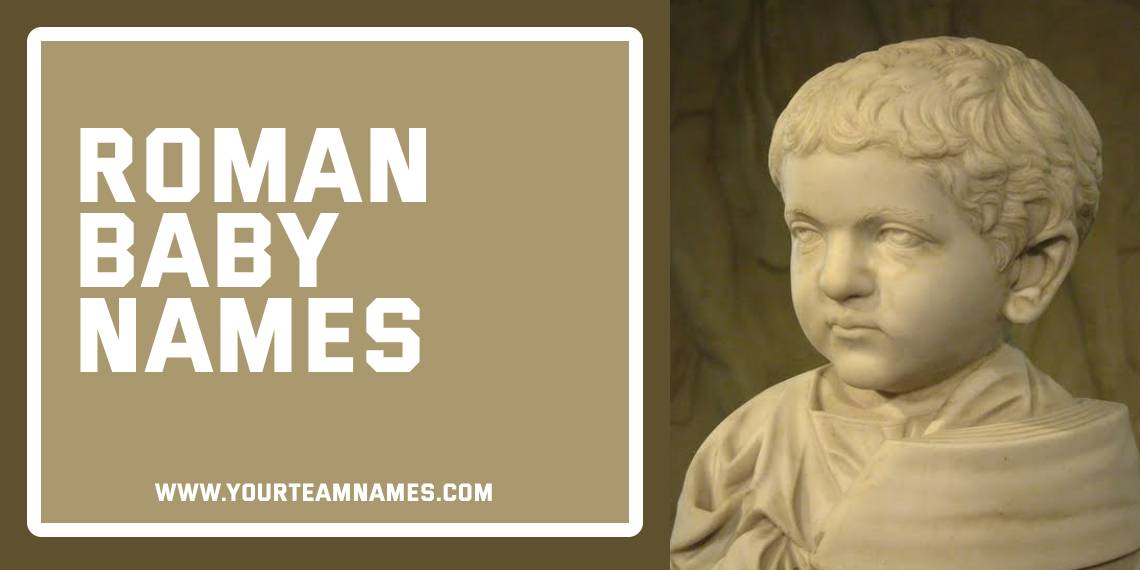400+ Roman Baby Names for Boys & Girls With Their Meanings
Timeless, powerful, and full of history — explore over 400 Roman names, each with its rich meaning and story, perfect for your little emperor or empress.

You know that moment when you hear a name and it feels like you just opened a secret door to another world?
That’s how Roman names are for me. They’re like time machines — one second you’re here, sipping your coffee, and the next you’re walking cobblestone streets, hearing the buzz of the Forum, catching the scent of fresh bread baking in clay ovens.
Roman names aren’t just old — they’re timeless. They carry centuries of myth, history, and drama (and let’s be honest, a touch of scandal — because Romans were messy in the best way). Whether you’re into bold gladiator vibes, elegant goddess energy, or sweet nature-inspired gems from ancient Latin, there’s a Roman name waiting to steal your heart.
So, grab your mental laurel wreath, and let’s wander through 480+ Roman baby names that might just be your future little one’s forever title.
Nature-Inspired Beauties
Because the Romans were nature lovers before it was an Instagram aesthetic.
Girls
- Flora – Goddess of flowers and spring; perfect for your own little bloom.
- Silvia – Means “from the forest”; gentle yet strong.
- Livia – From lividus, meaning “bluish”; gives ocean-meets-sky energy.
- Marina – “Of the sea”; breezy and elegant.
- Aurelia – “Golden”; a sunbeam of a name.
- Camilla – Legendary warrior maiden; strong yet graceful.
- Rosa – Simply “rose”; timeless floral charm.
- Lucia – “Light”; glows from the inside out.
- Aurora – Goddess of dawn; poetic and radiant.
- Viola – “Violet flower”; vintage charm.
- Clementina – “Mild, merciful”; citrus-bright and sweet.
- Palma – “Palm tree”; sunny and tropical.
- Prunella – “Little plum”; adorable yet refined.
- Meliora – “Better, improved”; like a blossoming garden.
- Flavia – “Golden-haired”; a natural sunbeam.
- Aqua – “Water”; simple, serene, and modern-feeling.
- Caelina – “Heavenly”; sky-blue beauty.
- Oleana – From olea (“olive”); Mediterranean warmth.
- Campanula – “Little bellflower”; whimsical and rare.
- Narcissa – “Daffodil”; floral drama in the best way.
Boys
- Silvanus – God of forests; earthy and rooted.
- Flavian – “Golden-haired”; perfect for a sunny soul.
- Marinus – “Of the sea”; cool and breezy.
- Lucius – “Light”; sharp yet warm.
- Julius – Rooted in the downy-haired gens Julia; classic Roman power name.
- Viridian – From “green”; artistic and modern-feeling.
- Faunus – God of woods and fields; playful and rustic.
- Cornelius – From “horn”; noble and enduring.
- Hadrian – Linked to the Adriatic; sophisticated traveler vibe.
- Prunus – “Plum tree”; quirky and sweet.
- Florus – “Flowering”; gentle and poetic.
- Aurelian – “Golden”; noble and radiant.
- Severian – “Of the seeds”; rare and earthy.
- Laurentius – “From Laurentum” (place of laurels); victory symbolism.
- Salvius – “Safe, healthy”; herbal and wholesome.
- Castor – Possibly from “beaver”; myth-meets-nature.
- Rufinus – “Red-haired”; fiery warmth.
- Aquilo – “North wind”; cool and brisk.
- Albanus – “From the white hills”; clean and classic.
- Candidus – “Bright, shining white”; pure and fresh.
Old-School Cool: Gladiator & General Energy
These names feel like they walk into the room wearing a toga and commanding respect.
Boys
- Maximus – “Greatest”; Russell Crowe made it a household name.
- Cassius – Sharp, sleek, and Shakespeare-approved.
- Tiberius – Imperial and serious; perfect for someone destined to lead.
- Octavius – “Eighth”; elegant yet approachable.
- Brutus – Strong, blunt… and a little infamous.
- Gaius – Ancient and easygoing; rolls off the tongue.
- Aurelian – “Golden”; romantic and kingly.
- Trajan – Celebrated emperor; rugged and respectable.
- Cicero – “Chickpea” in origin (yes, really) but better known for eloquence.
- Severus – “Stern”; Slytherin Headmaster vibes.
- Domitian – Imperial name; formidable presence.
- Vespasian – Flavian dynasty emperor; sharp and strong.
- Scipio – Famous general; sleek and commanding.
- Marcellus – “Little warrior”; fierce but refined.
- Quintus – “Fifth”; clean and classic.
- Drusus – Ancient military family name; strong bite.
- Germanicus – “Of Germania”; victory-laden name.
- Fabius Maximus – Strategic mastermind; layered gravitas.
- Otho – Emperor with a short but dramatic reign.
- Cato – Stoic statesman; wise and resolute.
Girls
- Valeria – “Strength”; confident and lovely.
- Claudia – From claudus (“lame”), but worn by powerful patrician women.
- Drusilla – Regal and slightly mysterious.
- Agrippina – Historical powerhouse name; bold choice.
- Livia Drusilla – Full empress flair.
- Domitia – Feminine yet fierce.
- Antonia – Strong, noble, and timeless.
- Cornelia – Classic matronly grace.
- Vibia – Quirky but chic.
- Severa – Strong, resolute, unapologetic.
- Livilla – “Little Livia”; petite but potent.
- Messalina – Infamous empress; beauty and scandal in one.
- Fabiana – From faba (“bean”); soft yet noble.
- Marcellina – Feminine form of “Marcellus”; warrior grace.
- Sabina – Of the Sabine women; tied to legendary Roman history.
- Paolina – “Small”; charming with a touch of steel.
- Calpurnia – Historical wife of Caesar; refined and fateful.
- Lollia – Patrician family name; light and unique.
- Julia Augusta – Empress title; layered in grandeur.
- Flavia Maxima – “Golden greatest”; imperial in every sense.
Myth & Legend
Straight from the pantheon — these names carry divine drama.
Girls
- Diana – Goddess of the hunt; independent and wild-hearted.
- Minerva – Goddess of wisdom; for a brainy little star.
- Venus – Goddess of love; lush and glamorous.
- Vesta – Goddess of the hearth; homey yet mystical.
- Fortuna – Goddess of luck; for the little lucky charm in your life.
- Juno – Queen of the gods; regal and protective.
- Proserpina – Goddess of spring and the underworld; dual nature beauty.
- Bellona – Goddess of war; fierce energy.
- Ceres – Goddess of agriculture; grounded and nurturing.
- Luna – “Moon”; soft but powerful.
- Flora – Goddess of flowers; floral elegance.
- Aurora – Goddess of dawn; poetic radiance.
- Carmenta – Goddess of childbirth and prophecy; mystical and maternal.
- Salacia – Goddess of the sea; shimmering and graceful.
- Pomona – Goddess of fruit trees; sweet and rustic.
- Nona – One of the Fates; “ninth” and deeply symbolic.
- Egeria – Nymph of wisdom; mysterious and gentle.
- Fama – Goddess of fame and rumor; playful and bold.
- Pax – Goddess of peace; short, serene, and strong.
- Victoria – Goddess of victory; triumphant and timeless.
Boys
- Apollo – God of music and the sun; radiant.
- Mars – God of war; short, bold, and fiery.
- Jupiter – King of the gods; grand and confident.
- Mercury – Messenger god; quick-witted.
- Pluto – God of wealth and the underworld; darkly cool.
- Vulcan – God of fire; hot-tempered but creative.
- Neptune – God of the sea; powerful and deep.
- Janus – God of beginnings; symbolic for new life.
- Saturn – Titan of time; steady and wise.
- Cupid – God of love; playful and sweet.
- Faunus – Rustic god of forests; earthy charm.
- Liber – God of freedom and wine; spirited and festive.
- Quirinus – Guardian god of the Roman people; protective and noble.
- Summanus – God of night thunder; moody and intense.
- Terminus – God of boundaries; grounded and decisive.
- Portunus – God of harbors; safe passage and travel.
- Consus – God of counsel; wise and strategic.
- Vertumnus – God of seasons and change; adaptable and artistic.
- Hercules – Hero of strength; bold, adventurous, and unforgettable.
- Romulus – Legendary founder of Rome; fierce and iconic.
Rare & Unique Roman Finds
Because you deserve something nobody else at preschool is yelling across the playground.
Girls
- Aelia – “Sun”; warm and bright.
- Calpurnia – Julius Caesar’s wife; elegant and tragic.
- Drusilla – Ancient noble name; vintage and charming.
- Lavinia – Heroine of the Aeneid; poetic and dignified.
- Marcellina – Feminine of Marcellus; gentle and sweet.
- Octavia – Sister of Augustus; refined and stately.
- Cornelia – Matronly name; classy Roman gravitas.
- Valeria – “Strength”; sleek and strong.
- Prisca – “Ancient”; short and striking.
- Domitilla – Soft but imperial.
- Sabina – From the Sabine people; rustic grace.
- Tullia – Daughter of Cicero; historic and lyrical.
- Aurelia – “Golden”; glowing charm.
- Vibia – Rare family name; crisp and delicate.
- Agrippina – Powerful empress name; bold choice.
- Horatia – Feminine of Horatius; uncommon and rhythmic.
- Fabiana – From the bean growers; vintage chic.
- Claudia – “Lame” (but in a stylish ancient way).
- Flavia – “Golden-haired”; light and airy.
- Nerina – “Little water sprite”; gentle and rare.
Boys
- Aulus – Ancient praenomen; short and strong.
- Severus – “Stern”; perfect for Harry Potter fans.
- Marcellus – “Little warrior”; noble and enduring.
- Cassius – The lean, clever conspirator; sleek edge.
- Tiberius – From the Tiber River; smooth and powerful.
- Cato – Stoic philosopher; brisk and wise.
- Lucullus – Lavish Roman general; opulent feel.
- Paulus – “Small”; humble but classic.
- Fabius – Bean grower; gentle rustic charm.
- Gaius – Short, punchy, and oh-so-Roman.
- Livius – From the famous historian; quiet elegance.
- Decimus – “Tenth”; rare numeric name.
- Trajan – Legendary emperor; strong leader vibe.
- Brutus – Heavy history, strong impact.
- Atilius – Obscure gens name; antique cool.
- Nerva – Emperor name; crisp and unusual.
- Gallus – “Rooster” or Gaul; quirky and bold.
- Varro – Roman scholar; sharp and rare.
- Otho – Short and snappy; emperor name.
- Quintilian – “Fifth-born”; refined and melodic.
A–Z Roman Name Mega List
Here’s where we hit naming buffet mode — over 300 more Roman names, arranged alphabetically so you can easily browse. Each still comes with a mini meaning + vibe check.
A
- Aelius – “Sun”; bright, uplifting.
- Aemilia – Ancient noble family; refined elegance.
- Agrippa – Powerful general name; solid and historical.
B
- Balbus – Quirky cognomen meaning “stammerer.”
- Balbina – Feminine form; charmingly unusual.
- Brutus – Heavy history but undeniably Roman.
C
- Cassius – Sleek and sharp.
- Cornelia – Matriarchal strength with softness.
- Cato – Brisk, wise, and strong.
D
- Decimus – “Tenth”; numeric cool.
- Domitia – Noble family name; smooth and dignified.
- Drusus – Ancient warrior family; rare but bold.
E
- Ennius – Celebrated poet of Rome.
- Egnatia – Rare feminine gens name.
- Evander – Mythic hero who founded a city in Italy.
F
- Fabius – Bean grower; rustic and warm.
- Flavia – “Golden-haired”; soft light feel.
- Felix – “Lucky”; joyful ancient charm.
G
- Gaius – Short, iconic, and very Roman.
- Gallus – “Rooster” or Gaul; quirky.
- Gracchus – Statesman name; strong sound.
H
- Hadrian – Emperor who built the famous wall.
- Horatia – Rhythmic, historic feminine choice.
- Hostilius – Fierce early Roman king.
I
- Ignatius – “Fiery”; bold and saintly.
- Iovita – Feminine, tied to Jupiter.
- Iulius – The legendary Julius Caesar.
J
- Julia – Elegant and enduring.
- Junius – Noble gens; crisp and distinguished.
- Justa – “Fair, righteous”; simple and strong.
K
- Kaeso – Rare praenomen; sharp sound.
- Kalenda – From “calends,” the first day of the month.
- Kornelia – Variant of Cornelia, ancient twist.
L
- Lucius – “Light”; bright classic.
- Livia – Feminine grace and imperial elegance.
- Longinus – Rare and noble.
M
- Marcus – “Of Mars”; strong and timeless.
- Marcellus – “Little warrior”; historic flair.
- Maxima – “Greatest”; bold feminine pick.
N
- Nerva – Crisp emperor name.
- Nerina – “Little water sprite”; delicate.
- Numitor – Legendary king from Rome’s founding.
O
- Octavia – Sister of Augustus; refined.
- Otho – Short, snappy emperor name.
- Opimia – Rare and aristocratic.
P
- Paulus – “Small”; humble classic.
- Pompeia – Noblewoman’s name; dignified.
- Plinius – From Pliny the Elder; scholarly.
Q
- Quintus – “Fifth”; numeric charm.
- Quintilia – Feminine elegance with a number twist.
- Quirinius – God of the Roman state.
R
- Regulus – “Little king”; noble title.
- Rufina – “Red-haired” feminine form.
- Romulus – Legendary founder of Rome.
S
- Sabina – Rustic grace; from the Sabine people.
- Severus – “Stern”; sharp and strong.
- Servilia – Powerful matron of history.
T
- Tiberius – Named for the Tiber River.
- Tullia – Daughter of Cicero; lyrical.
- Trajan – Great emperor’s name.
U
- Ulpia – Feminine form tied to Emperor Trajan’s family.
- Urbicus – “Of the city”; rare and refined.
- Umbrius – From Umbria; rustic charm.
V
- Valeria – “Strength”; sleek.
- Vibius – Crisp and unusual.
- Vitellia – Ancient noble family name.
X
- Xanthus – “Golden-haired”; Greek-Roman crossover.
- Xenia – “Hospitality”; rare but graceful.
Y
- Yuliana – Roman take on Juliana.
- Yulius – Variant of Julius; archaic feel.
Z
- Zenobia – Queen who defied Rome; fierce.
- Zosimus – “Full of life”; rare and ancient.
Noble Houses & Imperial Lineage
Because some names just come with an air of privilege, prestige, and power.
Girls
- Aelia – Noble family name meaning “sun”; bright and aristocratic.
- Fabia – From faba (“bean”); surprisingly chic for its humble root.
- Licinia – Ancient patrician surname; refined and lyrical.
- Marcia – Linked to Mars; confident and warrior-like.
- Paulla – “Small”; delicate but with strong historical ties.
- Sabina – Refers to the Sabine people; elegant with a rustic twist.
- Sergia – From the old gens Sergia; rare and regal.
- Julia Domna – Empress name; lush and commanding.
- Pompeia – Connected to Pompey the Great; understated strength.
- Fulvia – Golden-haired noblewoman; vintage yet fierce.
- Agrippina – Latin, “wild horse.” Famous for Agrippina the Younger, mother of Emperor Nero and one of Rome’s most politically influential women.
- Antonia – Latin, from the Antonius family, one of the most powerful Roman dynasties.
- Claudia – Latin, “lame” or “enclosure.” From the Claudian clan, which gave Rome emperors, generals, and poets.
- Domitia – Latin, “tamed.” Worn by the empress Domitia Longina, wife of Emperor Domitian.
- Faustina – Latin, “fortunate, lucky.” Two empresses of this name were beloved for their grace and philanthropy.
- Flavia – Latin, “golden-haired.” From the Flavian dynasty, known for the construction of the Colosseum.
- Julia – Latin, “youthful.” Perhaps the most famous imperial family name of all — the Julian line gave us Julius Caesar.
- Livia – Latin, “blue, envious.” Livia Drusilla was the influential wife of Augustus, Rome’s first emperor.
- Marcella – Latin, “warlike.” The feminine form of Marcus, often linked to noble houses.
- Octavia – Latin, “eighth.” Sister of Augustus, remembered for her loyalty and dignity.
- Cornelia – Latin, “horn.” From the Cornelii family, one of the most prestigious in the Republic.
- Severina – Latin, “stern.” A name linked to the Severan dynasty, a powerhouse in Rome’s later years.
Boys
- Aelius – Means “sun”; imperial warmth and presence.
- Fabius – “Bean grower”; sounds scholarly and distinguished.
- Licinius – From licinus (“upturned”); noble, with a hint of quirk.
- Marcus – Associated with Mars; timeless leader name.
- Paullus – “Small”; a humble giant in Roman politics.
- Sabinus – From the Sabine region; strong cultural roots.
- Sergius – Old Roman family name; crisp and authoritative.
- Pompeius – Powerful and battle-tested.
- Fulvius – “Golden-haired”; warm and bold.
- Decimus – “Tenth”; sleek and commanding.
- Aelius – Latin, “sun.” Worn by Emperor Hadrian’s adopted heir, Aelius Caesar.
- Antonius – Latin, “priceless.” The family name of Mark Antony, Rome’s famous general and lover of Cleopatra.
- Aurelian – Latin, “golden.” Emperor Aurelian was known for restoring Rome’s eastern provinces.
- Brutus – Latin, “heavy.” The Bruti family played key roles in Rome’s politics, for better or worse.
- Cassius – Latin, “vain” or “empty.” From Gaius Cassius Longinus, one of Julius Caesar’s assassins.
- Claudius – Latin, “lame.” Emperor Claudius expanded the empire and improved Rome’s infrastructure.
- Cornelius – Latin, “horn.” A patrician family name tied to great military minds like Cornelius Scipio.
- Decimus – Latin, “tenth.” Decimus Junius Brutus was a celebrated Roman general.
- Domitian – Latin, “tamed.” Emperor Domitian ruled during Rome’s peak prosperity.
- Flavius – Latin, “golden-haired.” Carried by the Flavian dynasty of emperors.
- Hadrian – Latin, “from Hadria.” Emperor Hadrian built Hadrian’s Wall in Britain.
- Julian – Latin, “youthful.” From the Julian line — the same as Julius Caesar.
- Licinius – Latin, “generous.” Emperor Licinius ruled alongside Constantine the Great.
- Marcus – Latin, “dedicated to Mars.” One of the most popular Roman praenomina among nobles.
- Maximus – Latin, “greatest.” A name for leaders who wanted their legacy carved in stone.
- Octavius – Latin, “eighth.” The birth name of Augustus, Rome’s first emperor.
- Pertinax – Latin, “steadfast.” An emperor whose short reign left a mark on Roman politics.
- Severus – Latin, “stern.” Emperor Septimius Severus expanded Rome’s African territories.
- Tiberius – Latin, “of the Tiber River.” Second emperor of Rome, known for his strong leadership.
- Valerian – Latin, “strength, health.” Emperor Valerian fought to defend the empire against Persia.
Virtue & Value Names
Because Romans loved giving names that inspired moral greatness (and occasionally some shade).
Girls
- Felicitas – “Happiness”; a name full of joy and grace.
- Pietas – “Duty” or “devotion”; poetic and virtuous.
- Honoria – “Honor”; noble and sincere.
- Justina – “Just” or “fair”; sweet and balanced.
- Veritas – “Truth”; elegant and meaningful.
- Clementia – “Mercy”; soft and compassionate.
- Spes – “Hope”; short but powerful.
- Modesta – “Modesty”; vintage virtue charm.
- Fortitudo – “Courage”; striking and bold.
- Laetitia – “Joy”; lighthearted and pretty.
- Concordia – Meaning “harmony” or “agreement,” perfect for a peaceful little soul.
- Veritas – Latin for “truth,” and also the Roman goddess who personified it.
- Gratia – Means “grace,” often tied to elegance and divine favor.
- Fortuna – The goddess of fortune herself — perfect if you want destiny on your baby’s side.
- Sapientia – Latin for “wisdom,” ideal for a deep-thinking little one.
- Amicitia – Means “friendship,” for a warm, kind-hearted spirit.
- Pax – Short, strong, and peaceful — the literal Latin word for “peace.”
- Virtusina – A softer, feminine twist on “virtus” (virtue).
- Caritas – Means “charity” or “love for humankind.”
Boys
- Felix – “Lucky” or “successful”; cheerful and timeless.
- Pius – “Devout”; historically strong in faith and loyalty.
- Honorius – “Honorable”; dignified and calm.
- Justus – “Just” or “upright”; classic moral weight.
- Verus – “True”; short, strong, and handsome.
- Clemens – “Gentle, merciful”; quietly powerful.
- Spurius – Historically ironic (often meant illegitimate), but bold.
- Modestus – “Moderate”; refined and modestly confident.
- Fortis – “Brave”; straightforward and strong.
- Laetus – “Joyful”; rare and upbeat.
- Virtus – The Roman ideal of courage, honor, and excellence — the masculine heart of Roman virtue.
- Felix – Latin for “happy” or “fortunate,” and a very popular name in ancient Rome.
- Candidus – Means “pure” or “sincere,” also the root of “candid.”
- Valens – Latin for “strong” or “healthy,” a name used by Roman leaders.
- Constans – Means “steadfast” or “unchanging,” great for a dependable personality.
- Severus – Meaning “serious” or “stern,” famously worn by Emperor Septimius Severus.
- Magnus – Latin for “great,” used by leaders and conquerors.
- Pacis – Related to “pax” (peace), but with a unique, formal flair.
- Prudentius – Means “prudent” or “wise,” with a scholarly vibe.
- Fortunatus – Latin for “fortunate” or “blessed.”
- Claritus – Derived from “clarus” (clear, bright, famous).
- Benignus – Means “kind” or “benevolent,” a name that radiates warmth.
- Salvus – Latin for “safe” or “saved,” used in early Christian Rome.
Stage, Arena & Spectacle
Because ancient Rome was basically the Netflix of its time — from chariot races to epic tragedies.
Girls
- Acta – “Deeds” or “acts”; theatrical and bright.
- Hilaria – “Cheerful”; perfect for a vibrant soul.
- Ludica – “Games”; playful and unique.
- Venusta – “Charming”; beauty with wit.
- Pantomima – Performer of pantomime; quirky but memorable.
- Melodia – Musical and soft.
- Spectata – “Admired”; radiant and confident.
- Scaena – “Stage”; dramatic and stylish.
- Arena – “Sand”; nod to gladiator grounds.
- Cithara – Ancient lyre; lyrical and artsy.
- Aemiliana – Feminine form of Aemilianus, perfect for someone destined for grandeur.
- Flavia – From flavus (“golden”), popular among theatrical beauties and patrician families.
- Cornelia – A noble name tied to powerful Roman women who attended games in style.
- Calpurnia – Wife of Julius Caesar, with a regal, dramatic sound.
- Marcellina – Feminine form of Marcellus, often used for actresses and noblewomen.
- Valeria – Meaning “strength,” a fitting name for a heroine in the public eye.
- Domitilla – Linked to imperial games and noble patronage of spectacles.
- Livia – Graceful and commanding, worn by empresses who presided over grand events.
- Claudia – Prestigious patrician name tied to drama and high society.
- Agrippina – Famous for her political power and connection to Roman public life.
- Sabina – Evokes mystery and elegance, perfect for an actress or performer.
- Drusilla – Imperial-sounding, once borne by women who influenced public entertainment.
Boys
- Actor – “Doer”; both literal and dramatic.
- Hilarius – “Cheerful”; lively and lighthearted.
- Ludovicus – “Famous warrior”; fits a strong performer.
- Venustus – “Charming”; elegant masculine flair.
- Pantomimus – Theatrical name for a storyteller.
- Melodinus – Musical twist with gravitas.
- Spectatus – “Admired”; confident leader energy.
- Scaenius – “Of the stage”; artsy and rare.
- Arenius – From “arena”; bold and adventurous.
- Citharus – Musician’s name; refined yet lively.
- Maximus – Meaning “greatest,” often chosen for gladiators and champions.
- Tiberius – Strong, river-linked name worn by emperors who funded spectacles.
- Cassius – A sharp, stylish name tied to historical figures in public life.
- Marcellus – Popular with military leaders and arena patrons.
- Decimus – Meaning “tenth,” but carried a sense of prestige in the amphitheater.
- Caius – Cheerful and bold, worn by many patrons of Roman games.
- Lucius – Meaning “light,” tied to dramatic orators and theater patrons.
- Septimus – “Seventh,” but often used by noblemen who sponsored grand events.
- Vitus – Meaning “life,” a name that bursts with energy and movement.
- Aurelius – Golden, shining, perfect for a charismatic figure in the spotlight.
- Trajan – Name of a beloved emperor known for grand spectacles.
- Nero – Infamous but undeniably dramatic, tied to music, theater, and flamboyance.
- Quintillus – Stylish, noble, with a flair for public attention.
- Flavian – From the Flavian dynasty, patrons of the Colosseum.
- Gallus – Strong, warrior-like, often tied to gladiator names.
Celestial & Cosmic
Because Romans looked up to the night sky and saw gods, omens, and poetry.
Girls
- Stella – “Star”; eternally luminous.
- Caelina – “Heavenly”; airy and elegant.
- Aurorae – “Of the dawn”; ethereal beauty.
- Lunaria – “Of the moon”; mystical and bright.
- Sidonia – “Of the stars”; regal sparkle.
- Nova – “New”; fresh and brilliant.
- Astra – “Star”; bold cosmic charm.
- Caelestis – “Celestial”; divine and dreamy.
- Solina – “Sunlight”; warm and golden.
- Galatea – Mythical sea-nymph turned starry figure.
- Astraea – Goddess of justice and innocence, associated with the constellation Virgo.
- Luna – Meaning “moon,” soft and luminous.
- Aurora – Goddess of the dawn, bringer of first light.
- Vespera – Evening star, poetic and mysterious.
- Caelina – “Heavenly,” a rare Roman beauty.
- Serenella – From serenus, “clear, tranquil sky.”
- Celestia – Meaning “of the heavens,” regal and elegant.
- Phoebe – Linked to the moon in Greco-Roman myth.
- Nocturna – Of the night, mystical and rare.
- Astris – “Star,” radiant and unique.
- Galatea – Mythical name meaning “she who is milk-white,” tied to celestial stories.
- Caelestis – “Heavenly one,” deeply Roman in tone.
Boys
- Stellan – “Calm” and “star-like”; quietly powerful.
- Caelius – “Heavenly”; noble and rare.
- Aurorian – “Of the dawn”; poetic and hopeful.
- Lunaris – “Of the moon”; mysterious glow.
- Siderius – “Starry”; grand and elegant.
- Novian – “New”; uplifting and modern-feeling.
- Astrinus – “Of the stars”; bright and inspiring.
- Caelestinus – “Heavenly one”; lofty and graceful.
- Solaris – “Of the sun”; warm and majestic.
- Galateus – Star-linked sea mythology; rare and enchanting.
- Caelus – Roman god of the sky, majestic and divine.
- Sol – The sun personified, radiant and strong.
- Orion – The hunter constellation, eternally in the stars.
- Lucian – “Light,” refined and luminous.
- Sirius – The brightest star in the night sky.
- Atlas – The sky-bearer from myth, powerful and grand.
- Cosmas – From kosmos, “order, universe.”
- Regulus – Bright star in Leo, meaning “little king.”
- Phoebus – The shining sun god, tied to Apollo.
- Altair – Bright star in the Eagle constellation.
- Pollux – One of the twin stars in Gemini.
- Aquila – The eagle constellation, bold and noble.
- Caelum – Latin for “sky” or “heaven.”
- Jove – Another name for Jupiter, king of the gods.
- Vulcanus – God of fire, volcanoes, and cosmic energy.
Wrapping It Up: Your Roman Name Story
If you’ve made it this far, I’m guessing you’re feeling the same thing I am: Roman names aren’t just names — they’re worlds. They carry poetry, grit, sunshine, moonlight, history, and yes, just enough drama to keep life interesting.
When you choose one, you’re not just giving your child a label — you’re gifting them a legacy. Whether you pick something soft and floral like Aurelia, bold and mighty like Maximus, or rare and sparkling like Proserpina, your little one’s name will hold a story worth telling.
So go ahead — scribble your favorites on a notepad, say them out loud, imagine them whispered at bedtime or cheered from the stands. Your perfect Roman name is waiting for you.





